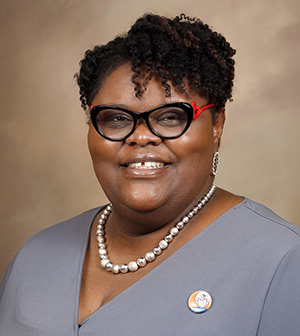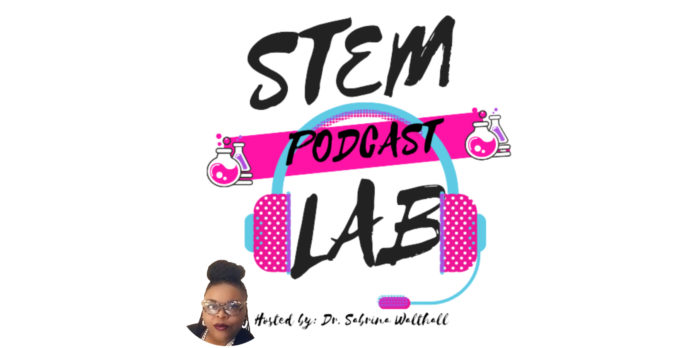A Mercer University professor’s podcast highlighting women in science, technology, engineering and math has been recognized among the best in its niche.
Dr. Sabrina Walthall, associate professor of science in the College of Professional Advancement, hosts the “STEM Lab Podcast,” which was ranked No. 13 among the Best 45 Women in STEM Podcasts. The ranking by Feedspot, a web content reader, was based on traffic, social media followers, domain authority and freshness.
Dr. Walthall said she created the “STEM Lab Podcast” two years ago to highlight women, especially those from marginalized groups, in STEM.

“I realized that the news media only seemed to highlight women who, of course, had done something just spectacular and over the top,” she said. “But I knew a lot of women, who I either went to graduate school with or met at conferences, who were doing great things. These are a lot of women already in the community, doing work in their own community, but no one really knows.
“And so, I just felt the podcast was a great way to put the story out there.”
Each episode, released monthly, features an interview with a woman who uses science, technology, engineering or math in her work. Episodes have featured two women who hold both M.D. and Ph.D. degrees, a registered nurse, an environmental neuroepidemiologist and a viral immunologist. A recent episode featured an unconventional woman in STEM — a celebrity cake artist.
“The baker was very unconventional, which I love because I don’t think people think of STEM in that way, and then just talking to her I realized, ‘All you do is STEM all day long,’” Dr. Walthall said.
Her podcast also dives into the challenges women, in particular marginalized women, face in STEM. One of her favorite episodes was an interview with Dr. Ansley Booker, director of diversity and inclusion initiatives at Mercer.
“In order for STEM to move forward, we really have to look at diversity, equity and inclusion,” Dr. Walthall said.
Representation of women in STEM varies widely, according to a recent Pew Research Center analysis of the STEM workforce.
While women make up half of those employed in STEM careers, they are overrepresented in health-related jobs but underrepresented in other fields, such as the physical sciences, computing and engineering. Meanwhile, Black and Hispanic workers (male and female) are underrepresented in the STEM workforce across the board, the analysis shows.
“A lot of times the reason all this is happening, and why I also try to work with girls in STEM, is because of gender stereotypes,” Dr. Walthall said. “It’s just been ingrained in us since we were young that certain careers belong to men and are masculine, and certain careers belong to women.
“And you don’t always hear of young girls being told that they should grow up to be a scientist or that they can be the engineer or that maybe they can be the mathematician.”
She said she hopes a young girl might hear the “STEM Lab Podcast” and discover she can be like the women being interviewed.
Dr. Walthall’s own love for STEM began when she was young. She became fascinated with science after being assigned a report on the heart.
“I learned the heart was not the shape of the candy box, but it was the size of our fist, and that fascinated me,” she said. “And I just remember learning all the information and just going around the house, spouting it to anybody who would listen to it.”
She went on to earn a bachelor’s degree in biology from Emory University and a doctorate in biochemistry and molecular genetics from the University of Alabama at Birmingham. She completed her postdoctoral training with the UAB Community for Outreach Development where she worked on rebuilding science education at the K-12 level in Alabama and discovered her passion for the science of teaching and learning.
Through a National Science Foundation fellowship, she was able to go into an Alabama high school and teach genetics. She realized she really enjoyed it.
“I would always make a story out of the science because that’s the way I’ve always seen science. It’s really, literally, a cartoon in my head,” she said. “I realized I could start a concept in a fun way and then build up to where we understand it truly scientifically, but I had to start them somewhere.”
In addition to her work at Mercer, prior to the COVID-19 pandemic, Dr. Walthall volunteered with the Real Impact Center, a Macon-based nonprofit dedicated to exposing girls to STEM careers.
She enjoyed the work so much that she incorporated it into her courses as a service-learning project, which included college students working with youth during events like STEM-tastic Saturdays and a Macon STEM Pop-Up.
The “STEM Lab Podcast” is available on Apple and Google Podcasts, Anchor, Spotify and YouTube.









